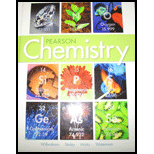
(a)
Interpretation: The amount of heat lost or gained when 0.625 mol of NaOH (s) is dissolved in water needs to be determined.
Concept Introduction: A measurement in one set of units can be converted into another set of units using a conversion factor.
(a)
Explanation of Solution
The enthalpy of the dissolution reaction of NaOH is -41.6 kJ/mol. Thus, if 1 mol of NaOH is dissolved in water, 41.6 kJ of heat is lost.
The amount of heat lost for 0.625 mol of NaOH will be:
Thus, the amount of heat lost is 26 kJ. Here, the negative sign shows the loss of heat.
(b)
Interpretation: The amount of heat lost or gained when 1.17 mol of water freezes at
Concept Introduction: A measurement in one set of units can be converted into another set of units using a conversion factor.
(b)
Explanation of Solution
The enthalpy of the fusion of water is 6.01 kJ/mol. Thus, for 1 mol of water, 6.01 kJ of heat is required for fusion. To freeze water, the same amount of heat will be lost and the value will be -6.01 kJ.
The amount of heat lost for 1.17 mol of water will be:
Thus, the amount of heat lost is
(c)
Interpretation: The amount of heat lost or gained when 0.30 mol of
Concept Introduction: A measurement in one set of units can be converted into another set of units using a conversion factor.
(c)
Explanation of Solution
Heat of vaporization of
The amount of heat required for 0.30 mol of
Thus, the amount of heat gained is
(d)
Interpretation: The amount of heat lost or gained when 0.66 mol of the steam condenses at
Concept Introduction: A measurement in one set of units can be converted into another set of units using a conversion factor.
(d)
Explanation of Solution
The heat of condensation of steam is 40.8 kJ/mol. Thus, for 1 mol of water, 40.8 kJ of heat is gained.
The amount of heat required for 0.66 mol of steam will be:
Thus, the amount of heat gained is
Chapter 21 Solutions
Chemistry 2012 Student Edition (hard Cover) Grade 11
 ChemistryChemistryISBN:9781305957404Author:Steven S. Zumdahl, Susan A. Zumdahl, Donald J. DeCostePublisher:Cengage Learning
ChemistryChemistryISBN:9781305957404Author:Steven S. Zumdahl, Susan A. Zumdahl, Donald J. DeCostePublisher:Cengage Learning ChemistryChemistryISBN:9781259911156Author:Raymond Chang Dr., Jason Overby ProfessorPublisher:McGraw-Hill Education
ChemistryChemistryISBN:9781259911156Author:Raymond Chang Dr., Jason Overby ProfessorPublisher:McGraw-Hill Education Principles of Instrumental AnalysisChemistryISBN:9781305577213Author:Douglas A. Skoog, F. James Holler, Stanley R. CrouchPublisher:Cengage Learning
Principles of Instrumental AnalysisChemistryISBN:9781305577213Author:Douglas A. Skoog, F. James Holler, Stanley R. CrouchPublisher:Cengage Learning Organic ChemistryChemistryISBN:9780078021558Author:Janice Gorzynski Smith Dr.Publisher:McGraw-Hill Education
Organic ChemistryChemistryISBN:9780078021558Author:Janice Gorzynski Smith Dr.Publisher:McGraw-Hill Education Chemistry: Principles and ReactionsChemistryISBN:9781305079373Author:William L. Masterton, Cecile N. HurleyPublisher:Cengage Learning
Chemistry: Principles and ReactionsChemistryISBN:9781305079373Author:William L. Masterton, Cecile N. HurleyPublisher:Cengage Learning Elementary Principles of Chemical Processes, Bind...ChemistryISBN:9781118431221Author:Richard M. Felder, Ronald W. Rousseau, Lisa G. BullardPublisher:WILEY
Elementary Principles of Chemical Processes, Bind...ChemistryISBN:9781118431221Author:Richard M. Felder, Ronald W. Rousseau, Lisa G. BullardPublisher:WILEY





